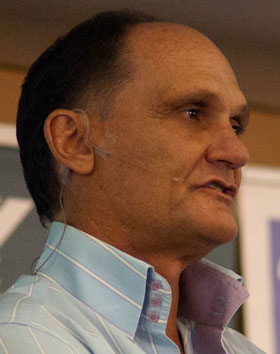
New Cell C CEO Alan Knott-Craig says the Independent Communications Authority of SA (Icasa) ought to cut the fees SA’s mobile operators charge each other to carry calls onto their networks to 25c/minute to facilitate further price competition in the telecommunications industry.
The fees, known as mobile termination rates (MTRs), are being brought down through an Icasa intervention and will reach 40c/minute in peak and off-peak times in March 2013. A few years ago, they were a high R1,25/minute, which critics said the dominant incumbents, MTN and Vodacom, used as a club to keep smaller rivals from competing effectively on price.
On Wednesday, Cell C announced it was slashing the cost of prepaid voice rates to 99c/minute with per-second billing. Knott-Craig tells TechCentral that “asymmetric” termination rates — where Cell C pays MTN and Vodacom less than they pay it to carry calls between their respective networks — had played a role in its decision to cut the retail tariffs.
Knott-Craig says he has looked at termination rates in markets around the world that are similar to SA’s and believes termination rates are still too high, despite the sharp reductions in the past three years. He says the 25c/minute rate that applies to calls to community service telephones should be the effective new rate for all calls. Even then, he says, 25c “may be too high”.
In a statement announcing the reduced prepaid tariffs, Knott-Craig says he wants Cell C to continue to enjoy asymmetric interconnect rates because this would help the company “achieve the scalability we need to compete even more fiercely with the large incumbents”.
The Cell C CEO, who is the former and founding CEO of Vodacom Group, says it’s a well-known but little-mentioned fact that both Vodacom and MTN benefited enormously from an asymmetric pricing arrangement with Telkom. The fixed-line operator paid the two mobile players far more to carry calls on their networks than they paid for calls terminated in the opposite direction.
With Cell C’s cuts in prepaid rates — and reductions in post-paid contract voice rates expected to follow soon — Knott-Craig says he hopes “Icasa and government are watching and listening”.
“MTRs are one weapon regulators have to get more competition in the market.”
He says any operator with less than 20% market share — Cell C’s share of the market is in the region of 13% — should enjoy beneficial asymmetric termination rates. Anything less than 20% would not have the desired results, he says.
With “vigilant” competition authorities, Knott-Craig says the “playing fields will be levelled and competition will flourish in the telecoms sector, with Cell C setting the pace”. — (c) 2012 NewsCentral Media




